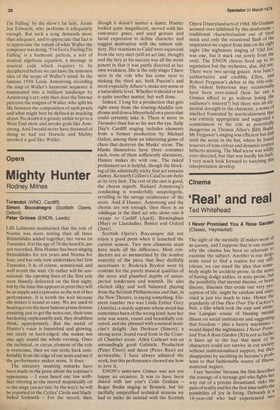Opera
Mighty Hunter
Rodney Milnes
Turandot (WNO, Cardiff) Simon Boccanegra (Scottish Opera, Oxford) Peter Grimes (ENON, Leeds) Lilli Lehmann maintained that the role of Norma was more testing than all three Briinnhildes added together; her views on Turandot, if at the age of 78 she heard it, are not recorded. Rita Hunter has been singing Briinnhildes for ten years and Norma for four, and has only now undertaken her first Turandot. It is, of course, sensational, and well worth the wait. Or rather will be sensational: the opening lines of the first aria were blandly delivered on the first night, but by the time this appears in print they will be as supple and expressive as the rest of her performance. It is worth the wait because she makes it sound so easy. We are used to hearing even the most famous prima donnas straining just to get the notes out, their tone hardening unpleasantly and, they doubtless think, appropriately. But the metal of Hunter's voice is burnished and glowing, not steely or hard-edged: she makes not one ugly sound the whole evening. Once the technical, or circus, element of the role is overcome, then we can settle back comfortably from the edge of our seats and see if the performance makes sense. It does.
The statutory insulting remarks have been made in the press about the soprano's appearance I even heard one low scribbler tittering as she moved majestically on to the stage (an act late, by the way): he will be reported to the Critics' Circle and blackballed forthwith For the record, then, though it doesn't matter a damn, Hunter looked quite magnificent, moved with her customary grace, and used gesture and facial expression to define character and suggest motivation with the utmost subtlety. Her reactions to Calaf were equivocal from the very start (still an act late, though) and the fury at his success was all the more potent in that it was partly directed at her own weakness. She is the only singer I have seen in the role who has come near to making the third act, both Puccini's and more especially Alfano's, make any sense at a naturalistic level. Whether it should or not is quite another matter, but well done.
Indeed, I long for a production that gets right away from the touring-Aladdin syndrome and does a Meyerhold on a piece that could certainly take it. There is more to Turandot than has so far met the eye. Sally Day's Cardiff staging includes elements from a former production by Michael Geliot, among them an infuriating game of chess that destroys the Masks' scene. The Masks themselves have three costumes each, none of them sufficiently alienatory, Hunter makes do with one. The raked permanent set is helpful, though the blocking of the admittedly tricky first act remains clumsy. Kenneth Collins's Calaf iscan-belto at its very best. The rest of the cast is good, the chorus superb. Richard Armstrong's conducting is wonderfully unapologetic, revelling in the savage exuberance of the score. And if Hunter, Armstrong and the chorus are not enough, then there is an odalisque in the third act who alone vaut le voyage to Cardiff (April), Birmingham (May) or Llandudno, Bristol and Oxford (June).
Scottish Opera's Boccanegra did not enjoy a good press when it launched the current season. Two new elements must have made all the difference. Most conductors are so mesmerised by the sombre austerity of the piece that they dutifully accentuate it: Roderick Brydon went by contrast for the purely musical qualities of the score and plumbed depths of unsuspected tenderness and warmth. He also elicited silky and well balanced playing from the Scottish Philharmonia and that, in the New Theatre, is saying something. Element number two was Linda Esther Grey (Amelia), a sturdy soprano whose metal has sometimes been of the wrong kind: here her tone was warm, round and beautifully coloured, and she phrased with a natural musician's delight. Jan Derksen (Simon); a strong actor, found vocal form in the Council Chamber scene. Allen Cathcart was an astoundingly good Gabriele. Production (Peter Ebert) and decor (Peter Rice) are serviceable. I have always admired the work, but this performance showed me how to love it.
ENON's semi-new Grimes was not too happy an occasion. It was to have been shared with last year's Colin Graham Roger Butlin staging in Brussels, but for tactfully unspecified technical reasons we had to make do instead with the Scottish Opera Disneyland sets of 1968. Mr Graham seemed over-inhibited by this misfortune traditional characterisation out of tired stock and only the occasional flash of the inspiration we expect from him on the right, night (the nightmare staging of 'Old Joe was one, but it stuck out, sorely from the rest). The ENON chorus lived up to its reputation but the orchestra, alas, did not. There were two saving graces: Ava June s authoritative and credible Ellen, and Robert Ferguson's debut in the title-role. His violent behaviour may occasionally have been over-stated (how far can a Grimes afford to go without losing the audience's interest?) but there was an elemental strength to the character, a sense of intellect frustrated by inarticulateness that was entirely appropriate and suggested a commitment to the role as potentially dangerous as Thomas Allen's Billy Budd' Mr Ferguson's singing was efficient but dull until the scene in the hut, where he found reserves of tone colour and dynamic control hitherto missing. The Mad scene was wildlY over-directed, but that was hardly his bid!. I very much look forward to watching this interpretation develop.






































 Previous page
Previous page